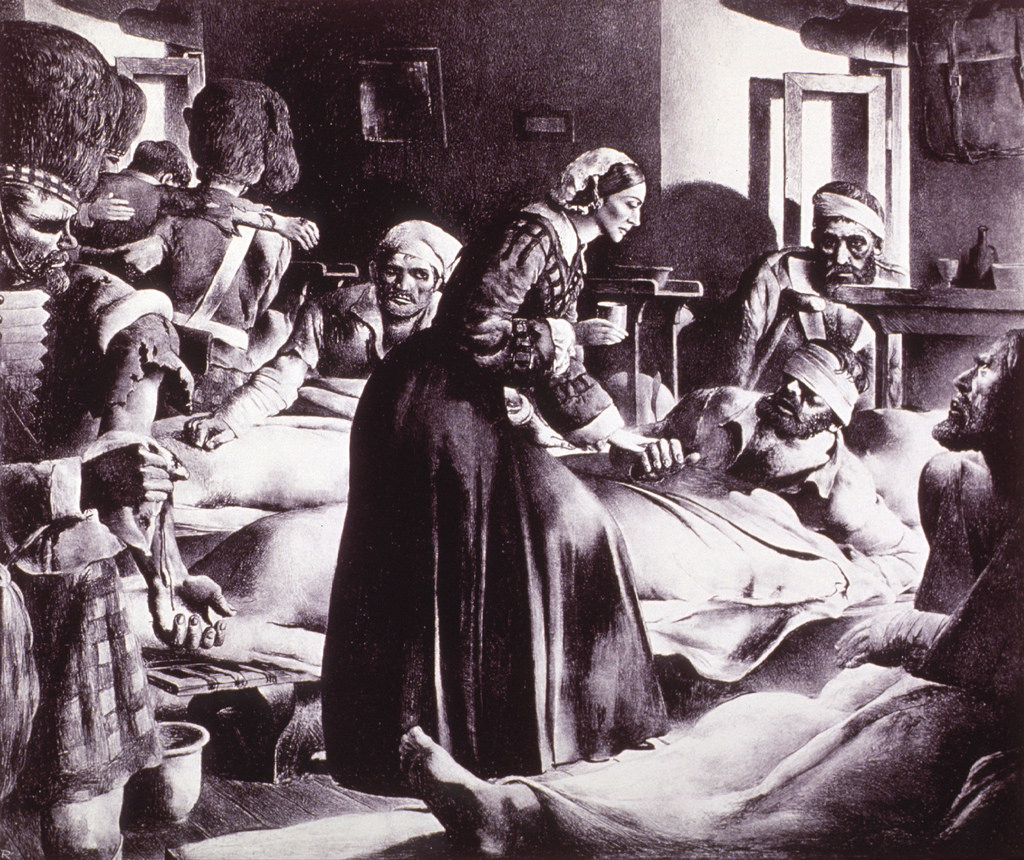“‘It would be a brave man that dare insult her…I would not give a penny for his chance,’ one British soldier wrote in a letter home from Scutari.”
“It may seem a strange principle to enunciate as the very first requirement in a hospital that it should do the sick no harm,” Florence Nightingale declared in her 1859 book named “Notes on Hospitals”. Nightingale, a passionate statistician, dedicated her life to the care of people in need, and is known as the founder of modern nursing. An effective nurse and mathematical genius, she transformed public healthcare in Britain, with her pioneering use of evidence-based medicine.
When the Crimean War broke out in 1853, Florence Nightingale was appointed Superintendent of the Female Nursing Establishment in the English General Military Hospitals in Turkey. Accompanied by 38 nurses, Nightingale discovered deplorable conditions in the Barrack Hospital in Scutari, Turkey on her arrival. Aside from the serious lack of hygiene practised in hospitals in this region, Nightingale discovered that each establishment had a different way of naming and classifying diseases, and so it was impossible to compare the severity of outbreaks in different hospitals. In response, Nightingale spearheaded the cleaning of the Barrack Hospital and ensured patients were treated with decency and respect. “It would be a brave man that dare insult her…I would not give a penny for his chance,” one British soldier wrote in a letter home from Scutari. Nightingale’s success in helping wounded soldiers in Scutari was reported in the press and she was hailed by both the media and the public as a heroine.
“It was discovered that 16,000 of 18,000 deaths were not due to wounds sustained in combat but due to preventable diseases, contracted because of unhygienic hospital conditions.”
Having earned the respect and assistance of Queen Victoria, she persuaded the government to set up a Royal Commission into the health of the army. With the help of a leading statistician of the time, William Farr, Nightingale analysed vast amounts of complex army data. She discovered that 16,000 of 18,000 British deaths in the Crimean War were not due to wounds sustained in combat but due to preventable diseases, contracted due to unhygienic hospital conditions. Nightingale understood the difficulty people had when faced with tables of data: she devised graphic methods of representing this data in order to optimise its effectiveness. She created a polar area graph, similar to a pie chart, calling it “rose diagram”, which highlighted the dramatic extent of needless deaths amongst the soldiers. This graph was a powerful tool to persuade the government and public to establish sanitary conditions in civilian and army hospitals. Commenting on the rose diagram, Nightingale said: “It should affect through the eyes what we fail to convey to the brains of the public through their word-proof ears.”
In 1858, Nightingale conducted an investigation on London hospital statistics. Likewise, the research founded that the record-keeping in the hospitals was majorly lacking in coordination, detail, and consistency. Absent from hospital records was useful information, such as the average duration of treatment or the ratio of patients who recovered to those who died from their illness. Upon these findings, Nightingale suggested the use of the same medical forms in all hospitals. Due to her extensive efforts in reporting statistical data for health reform, William Farr nominated Nightingale as the first woman to be elected as a Fellow of the Statistical Society of London. In addition, she was elected to the Statistical Congress, and made an honorary foreign member of the American Statistical Association. She was also the first woman to receive the Commonwealth’s Order of Merit in 1907.
In 1859, Nightingale published a book, “Notes on Nursing”, which aimed to educate people on how to care for sick relatives. Following this, she published “Notes on Hospitals”, and “Introductory Notes on Lying-in Institutions”, both of which were collaborative works with William Farr. In 1860, the International Statistical Congress endorsed Nightingale’s hospital reformation plans and, as a result, London hospitals began to comply with her proposals.
In 1890, a nursing school was founded in Nightingale’s name. She used her wealth to send trained nurses into workhouses, with a mission to help the poor. She remarked: “Every nurse ought to be careful to wash her hands very frequently during the day. If her face, too, so much the better.” She accepted germ theory and campaigned for famine relief, improved sanitary conditions, and the building of uncontaminated water supplies in India. By the time of her death, aged 90, she had helped overhaul army and public healthcare in Britain through her understanding and passion for statistics. Her mathematical work ensured the decline of preventable diseases, and saved many thousands of lives.






